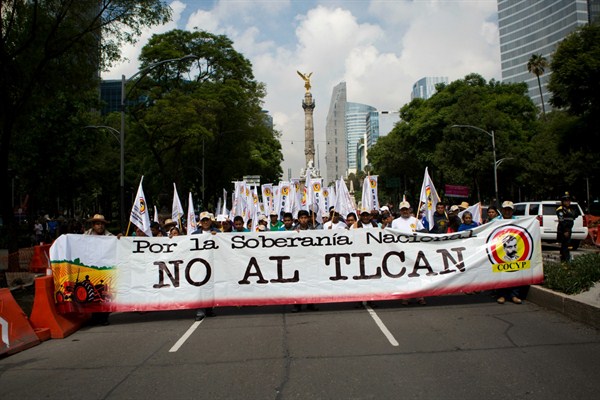More than two decades after it came into effect, the North American Free Trade Agreement is being renegotiated. NAFTA’s boosters say it has brought greater wealth to Canada, the United States and Mexico through economic integration, but some politicians—chief among them President Donald Trump—say it has cost millions of jobs. The current talks are being billed as a chance to reassess the agreement’s shortcomings and revamp it for the requirements of the 21st century. WPR has compiled 10 articles detailing what’s at stake for all parties involved.
Purchase this special report as a Kindle e-book.
Trump’s Gambit
Trump Should Look South to the Americas for His Trade Strategy
Despite the uncertainty caused by the NAFTA talks, it’s possible to chart a path forward that would leverage the agreement rather than eliminate it, suggested Jay Pelosky in March. As Trump contemplates a new trade order, he may be surprised to find he is pushing on an open door. If handled correctly, the talks could lead to a new cycle of U.S., regional and global growth.
Any prospect for a productive renegotiation of NAFTA is constrained by Trump’s penchant for antagonizing Mexico, which dates back to the first day of his campaign. In August of last year, Carin Zissis argued that his proposals targeting Mexico fail to take into account the two countries’ robust ties. Ultimately, his approach risks harming the U.S.
Trump’s main trade goals with America’s two closest neighbors appear to be increasing investment in manufacturing in the U.S. and reducing the trade deficit with Mexico. But NAFTA offers few tools to actually achieve those aims. Edward Alden argued in February that the president may simply settle for minor changes and declare victory, rather than risk a major trade dispute that could damage the U.S. economy heading into the 2020 campaign.
Trump’s early moves as president have spurred renewed determination among Latin American leaders to seek alternatives to partnership with the U.S., which is now viewed as unreliable and unpredictable. Frida Ghitis argued in February that if Trump continues to wall off major partners like Mexico, the winner of this realignment will almost certainly be China. For its part, Beijing has already been making significant inroads into the region.
The View From Mexico
Mexico has one of the highest rates of inequality among developed countries, with the richest 1 percent of the population owning almost half of the country’s wealth. While NAFTA has brought undeniable benefits to the economic elite, it has also exacerbated this disparity by leaving millions of ordinary workers in poverty. In a January email interview, Patricio Solís discussed how income inequality continues to generate social friction in Mexico.
While supporters credit NAFTA with transforming Mexico into a manufacturing giant and burgeoning tech hub, its critics say the agreement has only widened the gap between the “two Mexicos,” with an increasingly industrialized and middle-class north and a south that is still largely rural and impoverished. Paul Imison discussed this week the deeper institutional reforms required to make the renegotiation of NAFTA a boon for all Mexicans.
Despite receiving the brunt of Trump’s NAFTA-related criticism, Mexico has expressed surprising confidence that the deal can not only be saved but strengthened. Yet along with the unpredictability of the Trump administration, timing will be another major concern, Paul Imison wrote in May. Both Mexico and the U.S. face major elections in 2018, so unless talks wrap up faster than anyone expects, the desired outcome may be thwarted by a new political landscape.
Trump’s early threat to withdraw from NAFTA left President Enrique Pena Nieto eager to scout out alternative sources of foreign investment. Last December, Mexico held its first-ever auction for deepwater oil blocks in the Gulf of Mexico, and the big winner was Beijing. Jerónimo Mohar explained at the time how Trump’s protectionist posture could wind up pushing China and Mexico closer together.
How Canada Benefits
While free trade with the U.S. was the main factor motivating Canada and Mexico to participate in NAFTA, both sides have benefited from their own bilateral trade relations as part of the deal. In an email interview this week, Dan Ciuriak explained why this relationship is likely to survive any tampering by the Trump administration.
Mexico is by far Canada’s biggest trading partner in Latin America because of its physical proximity and established linkages through the regional value chains created by NAFTA. The deal has been such a success that Canada considers it a model for expanding trade relations deeper into the region. In an interview last July, Laura Macdonald discussed Canada’s growing ties in Latin America.

